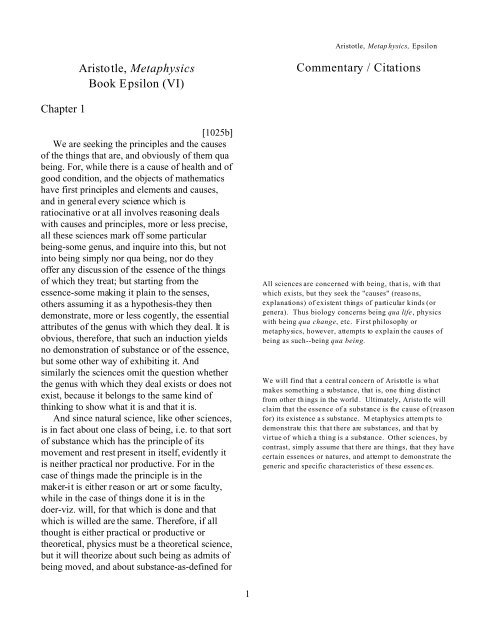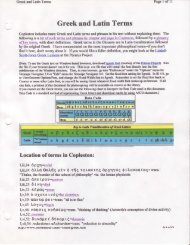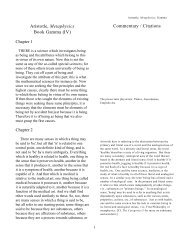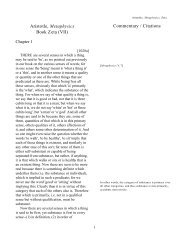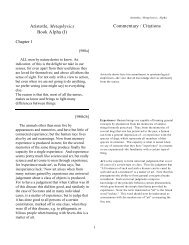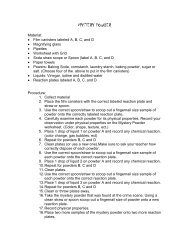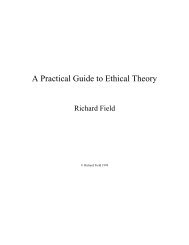Aristotle, Metaphysics Book Epsilon (VI) Commentary ... - CATpages
Aristotle, Metaphysics Book Epsilon (VI) Commentary ... - CATpages
Aristotle, Metaphysics Book Epsilon (VI) Commentary ... - CATpages
You also want an ePaper? Increase the reach of your titles
YUMPU automatically turns print PDFs into web optimized ePapers that Google loves.
<strong>Aristotle</strong>, <strong>Metaphysics</strong>, <strong>Epsilon</strong><strong>Aristotle</strong>, <strong>Metaphysics</strong><strong>Book</strong> <strong>Epsilon</strong> (<strong>VI</strong>)<strong>Commentary</strong> / CitationsChapter 1[1025b]We are seeking the principles and the causesof the things that are, and obviously of them quabeing. For, while there is a cause of health and ofgood condition, and the objects of mathematicshave first principles and elements and causes,and in general every science which isratiocinative or at all involves reasoning dealswith causes and principles, more or less precise,all these sciences mark off some particularbeing-some genus, and inquire into this, but notinto being simply nor qua being, nor do theyoffer any discussion of the essence of the thingsof which they treat; but starting from theessence-some making it plain to the senses,others assuming it as a hypothesis-they thendemonstrate, more or less cogently, the essentialattributes of the genus with which they deal. It isobvious, therefore, that such an induction yieldsno demonstration of substance or of the essence,but some other way of exhibiting it. Andsimilarly the sciences omit the question whetherthe genus with which they deal exists or does notexist, because it belongs to the same kind ofthinking to show what it is and that it is.And since natural science, like other sciences,is in fact about one class of being, i.e. to that sortof substance which has the principle of itsmovement and rest present in itself, evidently itis neither practical nor productive. For in thecase of things made the principle is in themaker-it is either reason or art or some faculty,while in the case of things done it is in thedoer-viz. will, for that which is done and thatwhich is willed are the same. Therefore, if allthought is either practical or productive ortheoretical, physics must be a theoretical science,but it will theorize about such being as admits ofbeing moved, and about substance-as-defined forAll sciences are concerned with being, that is, with thatwhich exists, but they seek the "causes" (reasons,explanations) of existent things of particular kinds (orgenera). Thus biology concerns being qua life, physicswith being qua change, etc. First philosophy ormetaphysics, however, attempts to explain the causes ofbeing as such--being qua being.We will find that a central concern of <strong>Aristotle</strong> is whatmakes something a substance, that is, one thing distinctfrom other things in the world. Ultimately, Aristo tle willclaim that the essence of a substance is the cause of (reasonfor) its existence as substance. M etaphysics attem pts todemonstrate this: that there are substances, and that byvirtue of which a thing is a substance. Other sciences, bycontrast, simply assume that there are things, that they havecertain essences or natures, and attempt to demonstrate thegeneric and specific characteristics of these essences.1
<strong>Aristotle</strong>, <strong>Metaphysics</strong>, <strong>Epsilon</strong>the most part only as not separable from matter.Now, we must not fail to notice the mode ofbeing of the essence and of its definition, for,without this, inquiry is but idle. Of thingsdefined, i.e. of 'whats', some are like 'snub', andsome like 'concave'. And these differ because'snub' is bound up with matter (for what is snubis a concave nose), while concavity isindependent of perceptible matter. If then allnatural things are analogous to the snub in theirnature; e.g. nose, eye, face, flesh, bone, and, ingeneral, animal; leaf, root, bark, and, in general,plant (for none of these can be defined withoutreference to movement-they always have matter),it is clear how we must seek and define the 'what'in the case of natural objects, and also that itbelongs to the student of nature to study evensoul in a certain sense, i.e. so much of it as is notindependent of matter.That physics, then, is a theoretical science, isplain from these considerations. Mathematicsalso, however, is theoretical; but whether itsobjects are immovable and separable frommatter, is not at present clear; still, it is clear thatsome mathematical theorems consider them quaimmovable and qua separable from matter. But ifthere is something which is eternal andimmovable and separable, clearly the knowledgeof it belongs to a theoretical science,-not,however, to physics (for physics deals withcertain movable things) nor to mathematics, butto a science prior to both. For physics deals withthings which exist separately but are notimmovable, and some parts of mathematics dealwith things which are immovable but presumablydo not exist separately, but as embodied inmatter; while the first science deals with thingswhich both exist separately and are immovable.Now all causes must be eternal, but especiallythese; for they are the causes that operate on somuch of the divine as appears to us. There must,then, be three theoretical philosophies,mathematics, physics, and what we may calltheology, since it is obvious that if the divine ispresent anywhere, it is present in things of this<strong>Aristotle</strong> is alluding here to the distinction betweenproperties and accidents. A prop erty includes a sp ecificproper matter within its definition. The proper subject or"matter" is that which can have the property. Thus"snubness" is defined as "concavity of the nose," the nosebeing the proper matter of snubness, since only noses canbe snub. An accident, however, like "concave" does notinclude a proper matter in its definition. Co ncavity isdefined as "inward curvature of a surface," where thesurface can b e that of anything. A ristotle's point here isthat if the characteristics of natural things are all propertiesof matter, where "of some material thing" must be includedin their definitions, then since physics studies nature,material things are the exclusive subject matter of thisscience. Physics is, then, the study o f being qua m aterial.<strong>Aristotle</strong>, however, will claim that immaterial things exist,and the study of such things can only be a concern of thescience of being qua being, viz., metap hysics. [Cf. Topics,I,5, for the distinction between properties and accidents.]A curious remark, considering that <strong>Aristotle</strong> just suggestedthat physics may deal exclusively with the material. Butphysics by definition concerns those things that have aninherent principle of change, and if indeed there are thingsthat change but exist separately from matter, their studywould fall und er physics. In fact, <strong>Aristotle</strong> did believe inthe existence of such things: the intelligences that movedthe heavenly bodies. Of the immovables that do not existseparately from matter, one example would be figure orshape: it makes no sense to say that triangularity moves orchanges, but this is a characteristic of material things alone.2
<strong>Aristotle</strong>, <strong>Metaphysics</strong>, <strong>Epsilon</strong>sort. And the highest science must deal with thehighest genus. Thus, while the theoreticalsciences are more to be desired than the othersciences, this is more to be desired than the othertheoretical sciences. For one might raise thequestion whether first philosophy is universal, ordeals with one genus, i.e. some one kind ofbeing; for not even the mathematical sciences areall alike in this respect,-geometry and astronomydeal with a certain particular kind of thing, whileuniversal mathematics applies alike to all. Weanswer that if there is no substance other thanthose which are formed by nature, natural sciencewill be the first science; but if there is animmovable substance, the science of this must beprior and must be first philosophy, and universalin this way, because it is first. And it will belongto this to consider being qua being-both what it isand the attributes which belong to it qua being.Throughout this passage, <strong>Aristotle</strong> is alluding to the PrimeMover--an immaterial and changeless being.3


